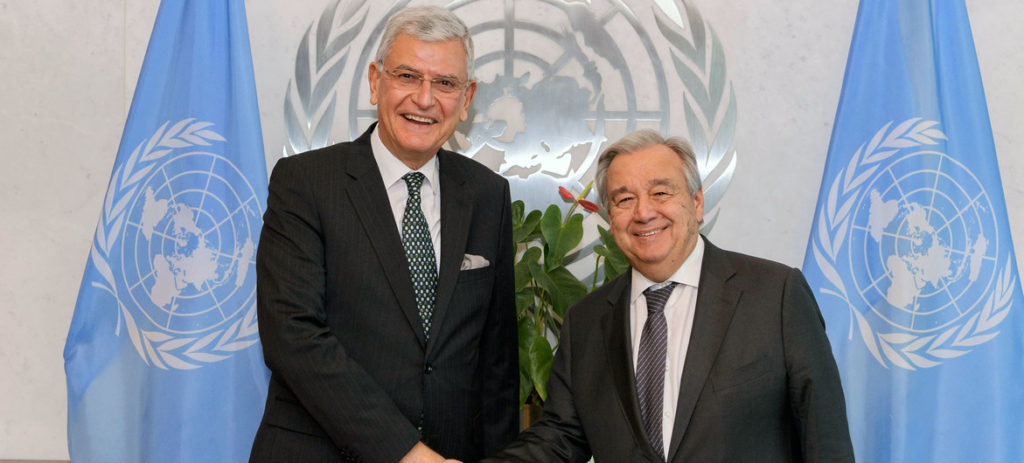New York, September 15 – The new leader of the United Nations General Assembly strongly warned that no country can fight the pandemic alone and it is the responsibility of the UN to strengthen the multilateral system to fight the virus that has claimed over 900,000 lives and infected over 27 million people worldwide in less than eight months.
“The pandemic has been used to justify unilateral steps and weaken the rules-based international system” said Volkan Bozkir as he opened the assembly session as its president. “International organizations have been reproached and the need for international cooperation has been questioned. These criticisms are not baseless. But their conclusions are misguided”.
“Make no mistake: No state can combat this pandemic alone. Social distancing will not help at the international level. Unilateralism will only strengthen the pandemic. It will move us further away from our shared goal. At this time of crisis, it is our responsibility to strengthen people’s faith in multilateral cooperation and international institutions, with the UN at their center.”
For the first time since the UN was established at the end of World War II, the meetings of the UN General Assembly will be held virtually. Presidents, prime ministers and diplomats of the 193 countries that are UN members will send pre-recorded speeches that will be broadcast to the mostly empty assembly hall which is under strict health measures to prevent infection.
“Covid-19 has become an overwhelming priority and focus right now,” said Volkan Bozkir, the president of the UN General Assembly president. He urged the assembly to confront Covid-19 through effective multilateral action because it is “testing our institutions like never before. We have a duty to take effective action at the global level to overcome this virus, and the havoc it is wreaking on our economies and societies.”

(UN General Assembly President Volkan Bozkir, left, and UN Secretary General Antonio Guterres, right)
The UN celebrates this year its 75th anniversary under the theme: “The future we want, the United Nations we need: reaffirming our collective commitment to multilateralism.”
Bozkir, a Turkish diplomat, said fighting the pandemic is an “overarching priority” and he plans to hold in-person meetings as long as the health conditions would permit because diplomacy requires face-to-face business.
The World Health Organization has asked the assembly and world leaders to give priority to fighting the pandemic and supporting a program named Access to COVID-19 Tools (ACT)-Accelerator, which calls for “a unique international collaboration to fast-track the development, production and equitable access to COVID-19 tests, treatments, and vaccines globally, while strengthening health systems.”
It said the ACT-Accelerator needs $35 billion to fast-track the development, procurement and distribution of 2 billion vaccine doses, 245 million treatments and 500 million tests over the next year.
It called also for maintaining the momentum in achieving the Sustainable Development Goals because the pandemic is unravelling decades of progress made to reach the goals, and to prepare for next pandemic “together, now.”
The streets and areas surrounding the UN headquarters in mid-town Manhattan will be mostly silent of presidential motorcades and police sirens. There won’t be the expected traffic jams, closure of streets and protests like in previous falls. The UN headquarters have exercised utmost health restraints imposed by New York State under Covid-19, including social distancing, wearing of facial masks and keeping the staff at 20 per cent of capacity.
The main piece of the annual session known as General Debate will take place September 22-29 during which 196 speakers have registered, most of them presidents and prime ministers, and their pre-recorded speeches will be aired to the empty hall.
The speakers on September 22 will the presidents of Brazil, the United States, Turkey, China, Russia, South Korea, Qatar, the Philippines, Morocco, Iran, France and South Africa.
UN Secretary General Antonio Guterres, who will address the 75th session, viewed it as an extended “people’s debate” which “promises to be the largest and furthest-reaching global conversation ever on building the future we want.”
Despite the pandemic threats and difficulties to perform regularly its annual functions, the UN will hold virtually a number of special high-level meetings during the General Assembly session to discuss topics close to all countries, which include a review of progress to implement the 17 Sustainable Development Goals, the unprecedented loss of biodiversity, gender equality and women’s rights and the deadly impacts of coronavirus across the world.
United Nations correspondent journalists – United Nations correspondent journalists – United Nations correspondent journalists – United Nations journalism articles – United Nations journalism articles – United Nations journalism articles – United Nations News – United Nations News – United Nations News

